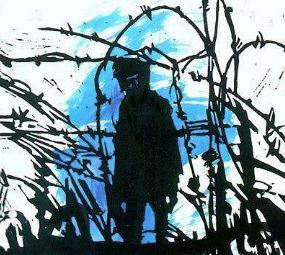Introduction
A webquest project uses the resources of the Internet to explore and answer questions pertaining to a particular topic. We are going to explore the background of the Holocaust in relation to the memoir Night. This webquest was designed to be used as a pre-reading activity for the book Night and combines the traditional elements of literature with the use of technology.
You will soon begin reading the memoir Night by Elie Wiesel. In preparation, it is extremely important that you gain the necessary background information in order to understand certain situations and events. This book is very disturbing as Mr. Wiesel shares his experiences in a Nazi Concentration Camp during World War II. Throughout the book, you will read about his horrific journey through evil and horror as a young European Jew.
Task
Task:
There are five sections in the WebQuest. Each section requires you to explore various topics related to the Jewish Holocaust. You will be given a selection of websites related to these issues from which to choose.
Process
Process:
Explore these sites for information about the themes or concepts that Elie Wiesel discusses in Night. You will be responsible for handing in your answers to the questions that accompany each topic. Write your answers on paper while using your computer to research. Answer all questions in full sentences.
Evaluation
Section I: About the Author
Visit the following website: Elie Wiesel Foundation ( https://eliewieselfoundation.org/ )
- Where was Elie born? In what year?
- What happened to him at the age of fifteen?
- Elie received an appointment from President Jimmy Carter. For what was that?
- Where did Elie live until his death?
- When did he die?
- What great honor did he receive in 1986?
Section II: The Final Solution
Visit the following website: United States Holocaust Memorial Museum: "Final Solution" Overview
6. Nazis coined the term "The Final Solution." To what does this term refer?
Why did they use this language?
7. What were some of the stages implemented as part of "The Final Solution?"
8. What was the intended purpose of these state-sponsored programs?
Visit the following website: United States Holocaust Memorial Museum: Ghettos
9. How were ghettos used just before and during WWII?
10. Where were the first ghettos set up?
11. How many ghettos were established?
12. Why did the Nazis initially set up ghettos?
13. What happened with the ghettos after the implementation of the "Final Solution" in 1941?
Section III: Concentration Camps and Auschwitz
Visit the following websites:
14. Where was (and still is) Auschwitz located?
15. What was Auschwitz?
16. How many people were killed there?
17. What were some of the things that first happened to people arrived at the camps?
18. What was everyday life like there in terms of clothing, food, and the bathrooms?
Visit the following website: United States Holocaust Memorial Museum: Gassing Operations
19. What were gas chambers?
20. Why did the Nazis begin using gas chambers instead of mobile killing units and shooting squads after a while?
21. What did the Nazi SS guards pretend the gas chambers were?
22. At the height of its operation, how many people were gassed daily at Auschwitz?
Section IV: Dr. Mengele's Experiments
Visit the following websites:
23. For what is Dr. Mengele famous? What was his role at Auschwitz?
24. On whom did Dr. Mengele primarily perform experiments? How did he rationalize these experiments on these people?
25. What was the purpose behind his experiments on twins? What did he hope to find out?
Section V: Assassination Attempts on "Der Fuhrer"
Go to the following website: Most Notable Attempts to Kill Hitler
26. What are your thoughts after reading through the article?
27. Which is the most interesting assassination attempt? Why?
Section VI: Memoir
28. What is a memoir?
29. How is different from a biography?
30. How is different from an autobiography?
27. What makes Night a memoir?
Conclusion
Part II: Exploring Genocide
For Part II, you will need to gather information about genocide: what it is, where it is happening, and where it has and continues to occur.
First, you will use Google to search the term and any related words or phrases.
- What are some examples?
- Is it happening today? Where?
- What are questions you have or things you wonder about genocide?





